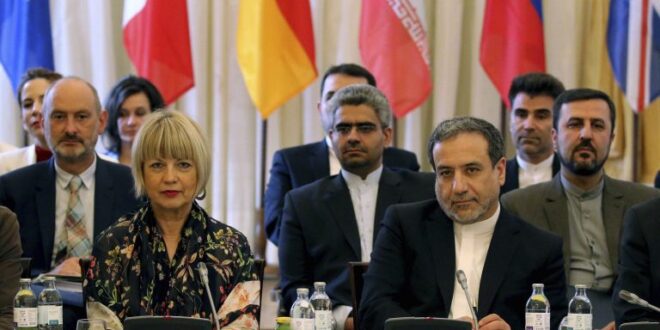U.S.-Iran nuclear talks in Vienna are making progress, but remain threatened by Israel-Iran conflict, Iranian naval challenges in the Persian Gulf, and political infighting in Tehran.
Israeli officials insist to the Biden administration that they will continue to act unilaterally against Iranian nuclear facilities, if necessary.
A backlash due to leaked comments by Iran’s Foreign Minister, coupled with signs of conciliation in Riyadh, will embolden Iran’s negotiators in Vienna to take a harder line in the nuclear talks.
Islamic Revolutionary Guard Corps (IRGC)-Navy harassment of U.S. naval forces in the Persian Gulf in April revives potential for direct U.S.-Iran clashes.
Several rounds of indirect talks between U.S. and Iranian negotiators in Vienna on a mutual return to the 2015 multilateral Iran nuclear agreement have been described by both sides as “constructive.” The two sides have reportedly clarified the steps each must make to return to full compliance. Iranian negotiators said on May 1 that there is tentative agreement on the core economic sanctions relief that the Biden administration will provide, although U.S. National Security Advisor Jake Sullivan has said the ultimate outcome of the negotiations remains uncertain. There were also unconfirmed Iranian press reports that Iran might agree to release some U.S.-Iran dual nationals held by Iran on various charges. Yet, a confluence of events and policies by and within Iran, and by regional countries such as Israel, could derail the forging of a final agreement.
In late April, following its reported responsibility for a covert attack on Iran’s main nuclear facility at Natanz, Israeli officials, including the director of its Mossad intelligence service, visited Washington to discuss Iran. Building on Israeli Prime Minister Binyamin Netanyahu’s outspoken criticism of the 2015 nuclear deal, the Mossad chief stated: “Israel will not allow Iran to attain nuclear arms. Iran has no immunity anywhere. Our planes can reach everywhere in the Middle East – and certainly Iran.” The Israeli message was clear: Washington’s diplomacy would not stop Israel from continuing to try to destroy Iran’s nuclear infrastructure if Iran’s nuclear program continues to advance. The Natanz attack did not cause Iran to leave the nuclear talks, but further such Israeli assaults could produce that result if Iranian leaders become convinced that the United States is unwilling or unable to prevail on Israel to cease such attacks.
Events inside Iran contribute to the uncertainty surrounding the ultimate outcome of the Vienna talks. As Iran’s June presidential election approaches, Iranian hardliners are trying to undermine Iranian moderates, particularly Foreign Minister Mohammad Javad Zarif, the chief Iranian architect of the 2015 nuclear deal. An interview was leaked in which Zarif blamed the late Islamic Revolutionary Guard Corps (IRGC) Qods Force commander Qasem Soleimani for attempting to block the deal when it was negotiated; he suggested that Soleimani steered Iranian foreign policy away from diplomacy and toward shoring up pro-Iranian governments and movements militarily. Soleimani, who was killed by a January 2020 Trump administration air strike, is revered by Iranian hardliners, and the leak put Zarif and his pro-diplomacy loyalists on the defensive. Further emboldening the hardliners are recent talks with Saudi Arabia, brokered by Iraq, and supplemented by statements by the Saudi Crown Prince Mohammad bin Salman expressing aspiration for a “good and special” relationship with Iran. The Saudi receptiveness to a détente with Iran is a sign that the Iranian strategy to pressure the Kingdom through direct and proxy missile strikes has yielded results. Pressure from empowered Iranian hardliners could cause Iran’s Vienna negotiators to raise their demands at the bargaining table, for example by insisting on U.S. guarantees that no future U.S. administration abrogate the agreement as the Trump administration did in 2018.
In concert with the infighting in Tehran, hardliners have sought to pressure the Biden administration by resuming IRGC-Navy “high-speed intercepts” of U.S. naval forces in the Persian Gulf. In late April, several IRGC-Navy fast patrol boats approached a U.S Coast Guard ship patrolling the Gulf, at one point getting as close as 68 yards and breaking off the encounter only after the U.S. ship fired warning shots at them. Apparently deterred for several years by the Trump administration’s threats to fire at IRGC naval challengers, the IRGC is testing the resolve of the Biden administration to maintain security in the Gulf, in light of the administration’s apparent commitment to diplomacy with Iran. Still, U.S. naval commanders always have a degree of discretion over when to use deadly force if threatened, and any IRGC-Navy approach has the potential to provoke a clash that sets back U.S.-Iran diplomacy. It is evident that there are any number of possible actions by any number of parties – including parties that are not involved in the nuclear negotiations – that could derail the plans of the Biden administration to reset U.S. policy toward Iran.
 Eurasia Press & News
Eurasia Press & News


